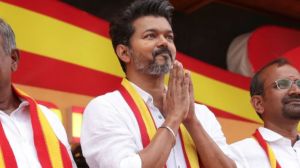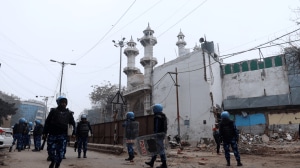Bus of opportunities
From a cricket series to a bus ride, some dramatic things have lately happened on the subcontinent's diplomatic scene. A set of curious m...

From a cricket series to a bus ride, some dramatic things have lately happened on the subcontinent8217;s diplomatic scene. A set of curious moves, apparently designed to promote goodwill and friendship between Pakistan and India, have taken people by surprise. Are the two countries on the threshold of evolving a new pattern of relationship?
The sceptics are obviously not convinced. Given the backlog of bitterness and distrust, nothing short of a miracle can produce a real breakthrough, a good many people are saying. But those who warn that it may well be a false alarm, are quite willing to wait and watch. Barring hard-core fanatics who smell a rat in the new-born enthusiasm for reconciliation, and have reaffirmed their resolve to foil a sellout bid, public opinion has by and large been for a give-and-take to ensure durable peace in the region.
When the Pakistani cricket team was threatened with physical assault and Bal Thackeray vowed not to let it play in India, some people in Pakistan wanted the tour calledoff. The Indian government went out of its way to assure foolproof security to the visiting team, and Islamabad accepted it as an indication of good faith. The success of the tour has been universally acclaimed not only in terms of sportsmanship on the field and tension-free matches, but also as a goodwill mission. The Shiv Sainiks were put in place, and the crowds that came to watch cricket bore no ill-will towards Pakistan. This would not have been possible without a political will on both sides.
Indian Prime Minister Atal Behari Vajpayee8217;s announcement of intent to take a bus ride to Lahore was a bombshell. But, more intriguing has been the ease with which his visit was finalised. Observers said Vajpayee would not have taken the initiative unless New Delhi had reached a prior understanding with Islamabad, or at least been assured of a positive response. Vajpayee8217;s bus ride to Lahore is indeed a landmark regardless of the misgiving that it will not make a substantive change in the mutually exclusivepositions of the two countries on the sources of discord. Even if one were to entertain the premise that normalisation of ties without addressing the core issue of discord amounts to 8220;biting the Indian bait8221;, it would be naive to suggest that Pakistani-Indian negotiations can make a move forward in the backdrop of bitterness and tension.
The first-ever India-Pakistan parliamentarian conference in Islam-abad has been another signal of a changing mood. Never before had such a large contingent of Indian politicians representing a cr- oss-section of political opinion, including har-d-core RSS men, come to Pakistan with the specific purpose of exch-anging ideas with their Pakistani counterparts on how to move towards a detente in the region. They, as some critics alleged, may have been paying mere lip service to friendship, but what they publicly said was a refreshing departure from the usual outpourings of hostility.
All outstanding issues were raised, including the Kashmir question, though no narrowing ofthe gap between the opposite stances was discernible. Nevertheless, everyone agreed that India and Pakistan, both poor and economically backward countries, should reorient their development priorities to improve the quality of life of the teeming millions, rather than allocate the lion8217;s share of their resources to building war machines.
Vajpayee8217;s visit to Lahore will leave a mark on the course of the normalisation exercise. The official dialogue cannot make any progress in the absence of a clear signal from the political bosses. Critics say the peace overtures by New Delhi do not signify a real change of heart. It is only under international pressure, or more exactly the compulsion, to meet the US requirements, that the BJP government has put up the facade of seeking friendship with Pakistan. Whether it is a policy shift or a tactical retreat, holding out an olive branch to Pakistan, as Vajpayee has done, is nevertheless a positive development in terms of its impact on the political climate. What is donecannot be easily undone. In any case it is in Pakistan8217;s national interest to de-escalate confrontation with India.
Some people in Pakistan are apprehensive about enlarging the areas of interaction and cooperation with India, fearing that it would adversely affect the Kashmir cause. They are, therefore. not in favour of a people-to-people contact campaign. The logic would have been valid, had there been any prospect of a breakthrough on Kashmir through confrontation.
An alternative approach is now needed to mobilise support for the settlement of the Kashmir dispute. Normalisation of ties with India will give Pakistanis the chance opportunity to influence opinion-makers across the border, and create a favourable climate for flexibility on issues of discord with Pakistan.
The government of Nawaz Sharif will accomplish a historic mission if it were to outgrow the confrontation syndrome, and negotiate a modus vivendi with the big brother. Outcries of a sell out on Kashmir should be ignored, as longas Pakistan has the ability to stick to its principled stance and makes no concession on the inalienable right of Kashmiris to self-determination. Since war is not an option to liberate Kashmir, and the world community is unwilling to pressure India beyond a certain limit to vacate its occupation of Kashmir, Pakistan will have to evolve a multidimensional strategy to cope with the problem.
Building public opinion within India for better relations with Pakistan should also be on Islamabad8217;s agenda. This task can be undertaken only if we lift the barriers to free travel and free flow of information. Expanding trade and other areas of economic cooperation should be seriously taken up to negotiate terms for a mutually beneficial accord.
Whatever Vajpayee8217;s motive, he can no longer treat Kashmir as a non-issue and seek reconciliation with Pakistan on his own terms. This is why our endeavour should be to help him out and not make things difficult for him if he is willing to find an honourable way out of India8217;senduring intransigence, and settle for a meaningful dialogue on the Kashmir question.
It is a tortuous path to friendship with India, but we have to make a beginning. It is a matter of safeguarding Pakistan8217;s economic future, and no one is better qualified than Prime Minister Nawaz Sharif to comprehend the urgency of wholeheartedly pursuing it.
A former editor of The Nation, the writer is with the Institute of Strategic Studies, Islamabad
- 01
- 02
- 03
- 04
- 05































